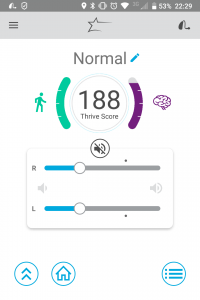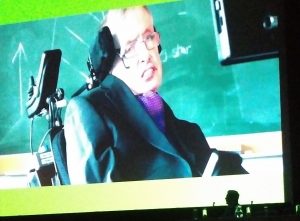For around 20 years now I have been working with young people with neurological diversities such as Autism, ADHD, Dyslexia, Pathological Demand Avoidance Syndrome (PDA) and a range of related conditions. More recently, the focus has been on Social, Emotional and Mental Health (SEMH) and the links between SEMH and Neurological Diversity are plentiful. People who are perceived as being different, or indeed are different often feel like they don’t fit and struggle to achieve in a neurotypical world with neurotypical expectations.
So, my job… well I do a range of things. Conference presentations and keynote speeches, training workshops and insets and my favourite, observing young people in the learning environment – boots on the ground. This can be for a variety of reasons, challenging or disruptive behaviour, difficulties integrating socially, problems accessing the curriculum, not engaging with learning and a whole raft of other reasons. I have no particular system that I follow, other than, I follow leads. I look for what is going wrong and try to remove it from the equation or I look at what is going well and try to replicate it – “more of what works and less of what doesn’t. A sort of “Non-system system”.
See Andrew at work
So, based on observations I have carried out in the classroom, strategies I have found successful and interventions which have proved effective, I have put together the following list of eight ADHD friendly practices. I sincerely hope you find them useful.
Normalise ADHD
Young people with ADHD often feel that they are being judged for being different and not succeeding and yet there are so many positives. People with ADHD are good at lots of things. They can focus on the minutiae of tasks, they are creative problem solvers, they have boundless energy and yet often have low self-esteem. Talk about their ADHD, ask them about what they like about their ADHD, ask them what it is about their ADHD that causes them problems.
In through the eyes and out through the mouth
Give them opportunity to talk
People with ADHD find talking the quickest, most efficient way of communicating information and yet we can find them verbally intrusive, accuse them of interrupting. Try to make opportunities for your ADHD learner to talk. This brings us to…
Use your visuals
For the most part people with ADHD are visual processors and yet in my experience, most teaching is auditory verbal. Try to use your visuals more; visual timetables, now and next boards, lists of instructions, flash cards for spellings and any other visual interventions you can think of.
Remember attention spans #1
Depending on what you read, ADHD attention spans vary greatly. The theory I like to use is that a child’s attention span is there age plus a minute up until the age of 16. If that child has ADHD or a related condition, you can knock a third off that figure. So, an 8-year-old child with ADHD has potentially a 6-minute attention span, and yet may be expected to sit through a 20-minute assembly followed by a further 20 minutes on the carpet listening to teacher.
Remember attention spans #2
In contrast to what we have just discussed, if a child with ADHD is really interested in something, they can have an almost unlimited attention span. This has a knock-on effect on teaching and learning, if you can engage the child with ADHD’s interest, you will have great success, if you deliver non – contextual learning and teaching you will not gain their engagement.
A short video about attention spans
Gross/fine motor hyperactivity
Sitting still and not fiddling is not the natural state for people with ADHD and yet I see many professionals telling them to “leave that alone”, “put that down” and “stop rocking on your chair”. Try giving them something to fiddle with; hand putty, fidget cubes, fidget spinners etc and for gross motor hyperactivity try fidgety feet wobblers (an intervention I find useful – pictured). 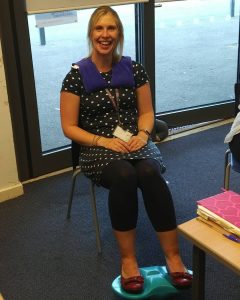
A short video about hyperactivity
Keep them busy
Staying busy works well for people with ADHD. Do you need a monitor for something? Do you need a personal assistant? Pencils need sharpening? Photocopying need doing? This is the ideal situation for a young person who finds sitting still a problem.
React/respond
Most teachers I work with agree that when working with young people with ADHD the hardest thing to manage is impulsive behaviour, in particular the tendency to react to situations without thinking through the repercussions. Spend time roleplaying situations that are either respond or react. Practicing this will prepare children to make the correct and appropriate choices in a range of situations.
Teaching a child with ADHD should not be difficult, just different. The problem with children with ADHD is not generally the ADHD but the expectation to behave neurotypically. With a few tweaks and some creative thinking, you will get significantly better results.
Let me know how you get on.
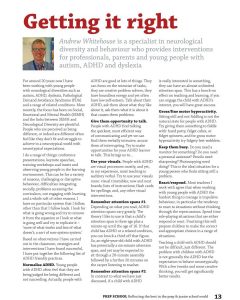
Andrew Whitehouse MSpEd CPSE (PGCert) BAHons QTS
SEN Consultant
TEDx Speaker
Bamford Lecturer
Adult with ADHD
07943838819
I would like to share with readers my experiences of the BETT Show 2019. BETT is an Education and Technology show held at the Excel and London and this is my third year of attending. One of the things I love about it is that you really never know what you are going to experience next! Some of the things I enjoyed most this year were playing with robots (there were a lot of robots), virtual reality experiences and meeting and chatting with IT experts from around the world.
Some of the standout experiences included the Special Direct stand. They specialised in technology for children with special needs and had lots of really relaxing toys like a vibrating pillow, a sensory tool for checking humidity, noise levels and light levels in the room and traffic lights with timers to help with stress and anxiety.

BETT is massive and you never really know what is around the next corner – it could be a drone, 3d printers or even a time machine – we saw a real life Back to the Future DeLorean Car!
My favourite stand is Pi-Top and I always spend a lot of time with them. Pi-Top produce Maker
Computers that you code yourself to meet your own needs. I love mine and so I am always interested in what new innovations are happening. This year I went to the stand and they gave me a tour of their stand, let me play with their new Pi-Top 4 and even interviewed me for their podcast!
 Fame at last!
Fame at last!
The worst thing about BETT? Going home when it is finished.
Isaac Thomson Whitehouse
Instagram @Isaacpi4468
 So far so… actually, much more than good!
So far so… actually, much more than good!
So, I know a lot of people have been interested in my experiences with hearing aids. I can understand that, they’re technology, right? We all love a bit of tech, right? And speaking of tech, technically the Livio AI are my second pair of hearing aids, my first set were given to me in November 2018, but I only had them for a few weeks before Starkey asked me if I would like to trial the Livio AI; a smart hearing aid that does lots of cool stuff. My imme
diate thoughts are that from a comfort point of view, these hearing aids fit in just lovely next to my glasses and really give me no trouble at all. However, for me the major benefit is the ability to run them from a phone app. This means that I can do a lot of things with my hearing aids that I couldn’t do before.
Immediately, the difference between the Livio AI and my previous hearing aids is the sound improvement. After a few days I started to notice that peripheral noises seemed to be less of a problem. In addition to that, I can actually alter the direction that the sounds come from, for example if I am in a large auditorium in the back-right hand corner I can set the microphone to a suitable angle, or I can set it
to track sounds automatically. As a public speaker with a significant conference profile this is a big game changer.
The Thrive App is a lot of fun! The fitness tracking is of particular interest to me. I don’t really get enough exercise, but I am definitely of the school of “don’t eat between meals, always use the stairs” and although I don’t carry excess weight, I like to keep it that way, so I love the step count – I will go for a walk in the evening if I don’t hit the mark. A perfect motivator. With regard to the co
gnitive engagement feature, my mother once said I don’t listen e
nough! This is a good way to keep an eye on my listening and engagement habits. So far, my best Thrive score is 188 out of 200. I will hit 200!
Best bits so far:
-
Out and about in noisy places, shows, conferences etc. Much less stressful
-
Not having the telly up loud
-
Being proud to show off my ‘ear tech’
-
But mostly this video from my buddy Greg over a coffee… https://photos.app.goo.gl/XDsvVWFroxMKQB8k8
-
Greg having his coffee

For some time now I’ve been becoming increasingly aware that my conversational vocabulary has largely consisted of “eh”, “yer what”, and in more polite company “pardon me” and “I’m sorry”. More and more I find myself getting agitated when people don’t anunciate, talk to me from a different room, or walk away while they are talking. So, I decided to do something about it. This took a lot of soul searching… I’m only 52, what if they give me hearing aids?
But then it occurred to me. In my workong day, I not only deliver public speaking events, I also work with children and young people who have special educational needs, many of whom have hearing aids and many of whom will not where them. Why is this? If i put on a pair of Calvin Klein glasses, it’s likely that people will comment on how good 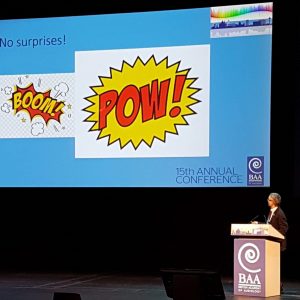 they look. If somebody chooses to wear earrings, again, people might also make a positive comment. But, a hearing aid is somehow different! A piece of technology, no matter how subtle, useful, just doesn’t seem to have the same effect.
they look. If somebody chooses to wear earrings, again, people might also make a positive comment. But, a hearing aid is somehow different! A piece of technology, no matter how subtle, useful, just doesn’t seem to have the same effect.
So, the plan… get hearing aids and use my influence to publicise them. However, there was a problem… the first audiologist I spoke to could not help me… he felt that I didn’t have hearing bad enough to treat. This seemed strange to me. I could not hear well and my lectures were becoming harder and harder to deliver – particularly the Q and A sessions. To quote Audiologist Claire Benton “They’re not mumbling Andrew”.

My hearing aid demonstration
Enter The British Academy of Audiology (BAA). Purely coincidentally I had been invited to deliver the Bamford Lecture for the BAA Conference where I was introduced to Audiologist and President of the BAA, Sue Falkingham from Starkey UK. Sue was fabulous “no problem at all, we’ll fix you up”
Within a fortnight I was in the Starkey UK factory in Stockport being shown around. How hearing aids were made, repaired, designed, refurbished, repaired. An experience somewhat akin to a trip around Willie Wonka’s Chocolate Factory. Fascinating. Hearing aids fitted, I was set!
So, two monts in, how am I getting on? Very well actually – yes the first few days were a sensory challenge, but I was determined to adapt, and the transition was very quick indeed. Some environments were more difficult than others, on the first Saturday I found myself in the swimming baths for my childre’s swimming lessons followed by a
trip to Asda. I learnt pretty early on that the trick is to anticipate the environment and adjust the volume in advance. Hey presto a good visit to the suprermarket/leisure centre. Conversely, some environments are less challenging and effortlessly enhanced; the theatre, family get togethers, coffee with friends and most importantly training events, lectures and workshops. Oh, and my family and friends have stopped mumbling! It really is a life changing experience.
So, why have I called this blog post a beginning? Yes, I have been asked by Sue Falkingham to be a hearing ambassador – in my own way, I have been integrating this into my day already, not missing any opportunities to talk about my hearing aids. Let’s be proud of our hearing technology. But also, following these experiences, I am now receiving an upgrade on Thursday. SMART Hearing Aids! Honestly I can’t wait! At the moment I know very little, but be assured that I will be sharing my experiences.
A beginning indeed!
Andrew
With thanks to Sue Falkingham, Starkey UK and Claire Benton and The BAA
PALACE THEATRE ANNOUNCES ALADDIN RELAXED PERFORMANCE
The Palace Theatre has announced that the performance of Aladdin at 5.30pm on 30th December will now be a relaxed performance, making the show accessible to an even bigger audience.
The relaxed performance sees elements of the pantomime toned down – no pyrotechnics or loud bangs are used, the house lights remain on during the performance and audience members are able to make noise and move around the auditorium should they need to. There will additionally be a quiet break out space available for anyone requiring it. These changes are intended to make the pantomime enjoyable for those on the autistic spectrum, those with learning difficulties or a sensory/communication syndrome.
Audience Development Manager for the Palace, Harriet Wright said “we’re thrilled to be offering this opportunity that will enable even more people to enjoy the pantomime magic. Panto is such a great experience for the whole family but we know that if one family member struggles with sensory stimulants for whatever reason, it can make coming to the theatre seem too overwhelming for them and in some cases also mean that the rest of the family chooses not to attend either. Panto is already a slightly more informal theatre experience than most shows but a relaxed performance allows us to take that several steps further, opening up a brilliant festive tradition to people who don’t otherwise feel able to attend.”
Aladdin runs from 7th – 31st December with tickets for all performances, including the relaxed performance, available from the Box Office in person or via 01636 655 755 or online at palacenewark.com.
A day course for Educators, Support Staff and SENCos who have roles supporting learners with Social, Emotional and Mental Health (SEMH) difficulties and Social and Emotional difficulties (SEDs).
This training focusses on the role of all those with a position of coordinating, supporting a class, group interventions and/or individual children.
The aim of this course is to develop knowledge, skills and confidence in teaching and supporting pupils with Social and Emotional Difficulties. It highlights distinctive teaching and support strategies and promotes the importance of analysing, planning, and feedback between staff. It explores ways in which barriers to learning can be reduced and promotes consistent methods of support
When: Tuesday 16th October 2018, 9:15 – 3:30
Where: Premier Meetings Liverpool Albert Dock
or
When: Wednesday 17th October 2018, 9:15 – 3:30
Where: Premier Meetings South Mimms/Potters Bar, Hertfordshire
or
When: Monday 5th November 2018, 9:15 – 3:30
Where: Greetwell Place, Lincoln
Cost £90 ex Vat per delegate – Parking, lunch and all refreshments are all provided.
To reserve your place click on the book/contact tab at the top of this page
Who:
Andrew Whitehouse MSpEd CPSE (PGCert) BAHons QTS

A truly inspirational gentleman.” Kate Brown, Flintshire County Council
Andrew Whitehouse is a specialist in neurological diversity and behaviour and provides interventions for professionals, parents and young people with Autism, ADHD, Dyslexia and related conditions. Andrew has a number of roles including training, strategies and therapies for education professionals in schools and colleges, observing learners in the learning environment and providing practical solutions to help them achieve their potential.
As well as running networking day courses across the UK for SEN, Andrew provides short courses for Bishop Grosseteste University and holds a number of UK and overseas contracts. Most recently, Andrew delivered a TEDx Talk “From Disability to Superpowers” which you can view here: https://andrewwhitehouse.co.uk/ .
Business privacy policy
This privacy policy sets out how People First Education Ltd uses and protects any information that you give People First Education Ltd when you use this website.
People First Education Ltd is committed to ensuring that your privacy is protected. Should we ask you to provide certain information by which you can be identified when using this website, then you can be assured that it will only be used in accordance with this privacy statement.
People First Education Ltd may change this policy from time to time by updating this page. You should check this page from time to time to ensure that you are happy with any changes. This policy is effective from [date].
What we collect
We may collect the following information:
- name and job title
- contact information including email address
- demographic information such as postcode, preferences and interests
- other information relevant to client surveys and/or services
What we do with the information we gather
We require this information to understand your needs and provide you with a better service, and in particular for the following reasons:
- Internal record keeping.
- We may use the information to improve our products and services.
- We may periodically send promotional emails about new products, special offers or other information which we think you may find interesting using the email address which you have provided.
- From time to time, we may also use your information to contact you for market research purposes. We may contact you by email, phone, fax or mail. We may use the information to customise the website according to your interests.
Security
We are committed to ensuring that your information is secure. In order to prevent unauthorised access or disclosure, we have put in place suitable physical, electronic and managerial procedures to safeguard and secure the information we collect online.
How we use cookies
A cookie is a small file which asks permission to be placed on your computer’s hard drive. Once you agree, the file is added and the cookie helps analyse web traffic or lets you know when you visit a particular site. Cookies allow web applications to respond to you as an individual. The web application can tailor its operations to your needs, likes and dislikes by gathering and remembering information about your preferences.
We use traffic log cookies to identify which pages are being used. This helps us analyse data about web page traffic and improve our website in order to tailor it to customer needs. We only use this information for statistical analysis purposes and then the data is removed from the system.
Overall, cookies help us provide you with a better website, by enabling us to monitor which pages you find useful and which you do not. A cookie in no way gives us access to your computer or any information about you, other than the data you choose to share with us.
You can choose to accept or decline cookies. Most web browsers automatically accept cookies, but you can usually modify your browser setting to decline cookies if you prefer. This may prevent you from taking full advantage of the website.
Links to other websites
Our website may contain links to other websites of interest. However, once you have used these links to leave our site, you should note that we do not have any control over that other website. Therefore, we cannot be responsible for the protection and privacy of any information which you provide whilst visiting such sites and such sites are not governed by this privacy statement. You should exercise caution and look at the privacy statement applicable to the website in question.
Controlling your personal information
You may choose to restrict the collection or use of your personal information in the following ways:
- whenever you are asked to fill in a form on the website, look for the box that you can click to indicate that you do not want the information to be used by anybody for direct marketing purposes
- if you have previously agreed to us using your personal information for direct marketing purposes, you may change your mind at any time by writing to or emailing us at enquiries@peoplefirsteducation.co.uk
We will not sell, distribute or lease your personal information to third parties unless we have your permission or are required by law to do so. We may use your personal information to send you promotional information about third parties which we think you may find interesting if you tell us that you wish this to happen.
You may request details of personal information which we hold about you under the Data Protection Act 1998. A small fee will be payable. If you would like a copy of the information held on you please write to:
People First Education Ltd
Stonehouse
High Street
Fillingham
Lincolnshire
DN21 5BS
If you believe that any information we are holding on you is incorrect or incomplete, please write to or email us as soon as possible, at the above address. We will promptly correct any information found to be incorrect.
I was fortunate enough to see Professor Stephen Hawking speak via live link at NASEN Live last July (on my birthday). He really was truly inspirational!
Like everybody in the room, I filmed it on my phone so here it is for you to see:
https://photos.app.goo.gl/JJQksOLtggKi19ux2
Rest in the universe prof
Andrew
Dear People First Education readers,
Readers may remember that last year I reviewed my visit to BETT, a huge technology and education show that happens every year at the EXcEL Centre in London (The Week Junior issue no 63). Some of you may also remember that I promised to return in 2018 to write a follow up. This year, as always there were thousands of stalls, many of which were mind-blowing with their new innovations and ideas. I would like to tell you about my three favourites which were all very exciting for the way they stood out.
 TeacherGeek was all about problem solving and creating robots and machines. I was given a range of components and a broken machine which I had to fix by just using the pieces provided. I made some mistakes, but I had a lot of help from Darren Coon, the Chief Maker (below). Great fun!
TeacherGeek was all about problem solving and creating robots and machines. I was given a range of components and a broken machine which I had to fix by just using the pieces provided. I made some mistakes, but I had a lot of help from Darren Coon, the Chief Maker (below). Great fun!
Next was Lenovo Computers, who demonstrated their stand-alone Virtual Reality headset which didn’t need a computer or a phone to function. It was really good and had some fun programs and games including a cooking simulation which was very realistic.

With Jesse Lozano CEO Pi – Top
However, my favourite was Pi – Top, the organization which makes extra operating systems, software and hardware for the Raspberry Pi. Whilst I was there, I was lucky enough to be introduced to Jesse Lozano, CEO of Pi – Top who was interested to know what I’d been doing with my own Pi – Top and was very keen to share ideas and give me advice. My Dad asked “would it make me a cup of tea?” and Jesse replied “Yes it could”.
I was at BETT for one day last year, two days this year and I will probably need all four days in 2019 to take it all in. If you love tech, I definitely recommend BETT, you will be inspired and astounded at what is happening out there.
Thank you, from Isaac Thomson Whitehouse
Age 13, Year 8
Please take a moment to read about this little girl who I had the pleasure of working with.

https://www.justgiving.com/crowdfunding/indianna-rose-memorial?utm_id=66&utm_term=Jb6aA6vYg


